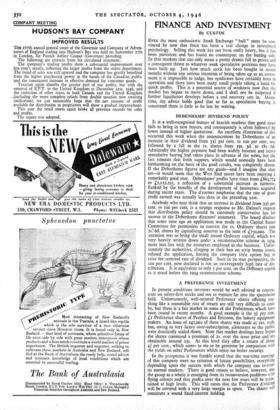FINANCE AND INVESTMENT
By CUSTOS
EVEN the most enthusiastic Stock Exchange " bull" must be con• vinced by now that there has been a real change in investment psychology. Selling this week has not been really heavy, but it has been persistent and has found no counterpart on the buying side. In thin markets that can only mean a pretty drastic fall in prices and a consequent threat to whatever weak speculative positions may have been built up. Just how much stock has been bought in recent months without any serious intention of being taken up as an invest- ment it is impossible to judge, but syndicates have certainly been in operation and there have been many small people taking a hand for quick profits. This is a potential source of weakness now that the market has begun to move down, and I shall not be surprised if further liquidation develops before a real recovery sets in. Mean- time, my advice holds good that so far as speculative buying is concerned there is little to be lost by waiting.
DEBENHAMS' DIVIDEND POLICY
It is a well-recognised feature of bearish markets that good news fails to bring in new buyers, and consequently is often followed by lower instead of higher quotations. An excellent illustration of this occurred this week when the announcement by Debenhams of an increase in their dividend from 334 per cent. to too per cent. was followed by a fall in the is. shares from 19s. 3d. 'to as. 6d. Admittedly the higher payment had been widely forecast and heavy speculative buying had taken place in advance of the news, but the fact remains that fresh support, which would normally have been forthcoming on the basis of the good results, was completely absent. If the Debenhams figures are any guide—and I imagine that they are—it would seem that the West End storeshave been enjoying a remarkably good year. Debenhams' profits have risen from £863,774 to £1,152,225, a reflection of a substantial increase in turnover, flanked by the benefits of the development of businesses acquired during recent years. The drectors emphasise that the rate of gross profit earned was actually less than in the preceding year.
Anybody who may think that an increase in dividend from 33+ per cent. to too per cent. is a strange response to Mr. Dalton's request that distribution policy should be extremely conservative has his answer in the Debenhams directors' statement. The board disclose that some time ago an application was made to. the Capital Issues Committee for permission to, convert the is. Ordinary shares into 2e 6d. shares by capitalising reserves to the tune of L75o,00o. The intention was to bring the small issued Ordinary capital, which was very heavily written down under a reconstruction scheme in 1934, more into line with the resources employed in the business. Unfor- tunately the authorities, clinging to their ban on scrip bonus issues, refused the application, leaving the company little option but to raise the nominal rate of dividend. Seen in its true perspective, the too per cent. now declared is not an extravagantly high rate of dis- tribution. It is equivalent to only 5 per cent. on the Ordinary capital as it stood before the 1934 reconstruction scheme.
A PREFERENCE INVESTMENT
In present conditions investors would be well advised to concen- trate on safety-first stocks and not to venture far into the speculative field. Unfortunately, well-secured Preference shares offering any- thing like a reasonable rate of return are still very difficult to come by, but there is a fair market in some of the Preferences which have been issued in recent months. A good example is the 5+ per cent. LI Preference shares of Peerless and Ericsson, the bakery equipment makers. An issue of 247,000 of these shares was made at 21S. each, but, owing to very heavy over-subscription, allotments to the public were drastically scaled down. Now that market dealings have begun the shares command a premium of 2s. over the issue price and are. obtainable around 23s. At this level they offer a return of about 4i per cent., which seems to me to be generous by comparison with the yields on other Preferences which enjoy no better security.
In the prospectus it was frankly stated that the war-time earnings of this company were no criterion of future possibilities, everything depending upon the success with which the company can re-enter its normal markets. There is good reason to believe, however, that the group as a whole is emerging from its reconversion problems with flying colours and that profits over the next few years will be main- tained at high levels. This will mean that the Preference dividend will be covered with a very large margin to spare. The shares will constitute a sound fixed-interest holding.






























 Previous page
Previous page